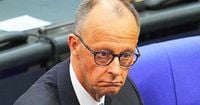On Tuesday, May 6, 2025, Friedrich Merz, the leader of the Christian Democratic Union (CDU), is set to be elected as the new Federal Chancellor of Germany in the Bundestag in Berlin. This significant political event marks a pivotal moment for the country as it transitions from the outgoing Chancellor Olaf Scholz, who served for over three years.
Following the election, Merz and his 17 federal ministers will receive their certificates of appointment from Federal President Frank-Walter Steinmeier. They will then be sworn in during a parliamentary session, paving the way for a fully functional government. The first meeting of the new cabinet, which comprises members from both the CDU and the Christian Social Union (CSU) along with representatives from the Social Democrats, is scheduled for Tuesday evening.
The political landscape in Germany has seen a notable shift with the CDU emerging as the strongest force in the recent elections held on February 25, 2025. This change in leadership is expected to bring about new policies and directions for the country.
In a farewell ceremony on May 5, 2025, Olaf Scholz was honored by the Bundeswehr, with a traditional military send-off featuring the Stabsmusikkorps performing the classic soul song "Respect." Many of Scholz's colleagues from his time in office attended the event, including Merz, who received well-wishes for his upcoming role.
Meanwhile, the geopolitical climate in the Middle East remains tense as Israel has launched a series of airstrikes against the Houthi militia in Yemen. Reports indicate that more than ten waves of attacks targeted the port city of Hodeidah and surrounding residential areas, as well as a cement factory located in eastern Hodeidah. The Houthi-controlled Ministry of Health reported that two individuals were killed and over 40 were injured in these strikes.
The Israeli military confirmed that dozens of targets were hit using approximately 20 fighter jets, a response to ongoing threats from the Houthi militia. Just two days prior, on May 4, a Houthi rocket struck near Ben Gurion International Airport in Tel Aviv, injuring eight people and escalating tensions further.
In a broader context, a recent survey by the United Nations Development Programme (UNDP) reveals that about 20 percent of the global population is now utilizing artificial intelligence (AI) in their daily lives. This survey, which included over 21,000 participants from 21 countries, highlights a growing trend towards the integration of AI across various sectors, including education and healthcare. The UNDP emphasized that two-thirds of respondents expect to implement AI applications within the next year, indicating a readiness for a technological transformation worldwide.
On the diplomatic front, U.S. President Donald Trump is scheduled to meet with Canadian Prime Minister Mark Carney on the same day, focusing on trade and security relations amid a backdrop of heightened tensions due to Trump's aggressive tariff policies. The meeting comes at a critical time, as Carney's Liberal Party recently won the parliamentary elections in Canada, and he has expressed that improving relations with the U.S. is a top priority.
Historically, the relationship between the U.S. and Canada has been characterized by cooperation; however, it has soured since Trump took office in January. The president has previously suggested that Canada should become the 51st state of the U.S., further straining diplomatic ties.
In another significant development, the Rwandan government is currently in discussions with the United States regarding the potential acceptance of migrants that the U.S. plans to deport. Rwanda's Foreign Minister Olivier Nduhungirehe stated that these negotiations are still in the early stages, and it remains uncertain how they will progress. This initiative follows Rwanda's earlier agreement with the UK to accept thousands of asylum seekers, an arrangement that was later rescinded by Prime Minister Keir Starmer.
Additionally, European Commission President Ursula von der Leyen has announced a plan to attract more scientists to the European Union with a substantial investment of half a billion euros. This funding, earmarked for the years 2025 to 2027, aims to position Europe as a leading destination for researchers worldwide. Von der Leyen emphasized the importance of safeguarding the freedom of scientific research and streamlining processes for entry and residence in Europe, as well as facilitating the commercialization of scientific findings.
As the political scene evolves in Germany with the election of Merz, the global landscape is also shifting, marked by military actions in the Middle East, diplomatic negotiations in North America, and a push for scientific advancement in Europe. Each of these developments reflects the complex interplay of national and international interests in a rapidly changing world.
Merz's ascension to the chancellorship could signify a new chapter for Germany, one that may impact not only its domestic policies but also its role on the global stage. As the new government prepares to take office, all eyes will be on how it navigates these pressing issues and the challenges ahead.

